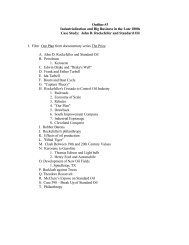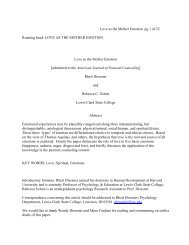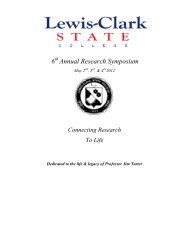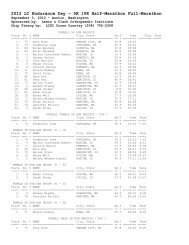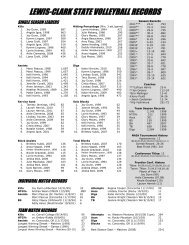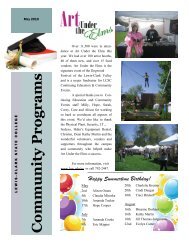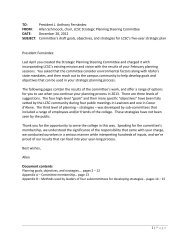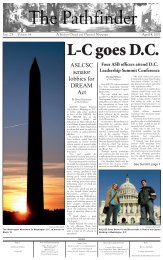1 CHAPTER 1: AMERICAN INDIAN SELF-DETERMINATION AND ...
1 CHAPTER 1: AMERICAN INDIAN SELF-DETERMINATION AND ...
1 CHAPTER 1: AMERICAN INDIAN SELF-DETERMINATION AND ...
You also want an ePaper? Increase the reach of your titles
YUMPU automatically turns print PDFs into web optimized ePapers that Google loves.
constituted an important part of President Johnson's<br />
expansive vision for America, the "Great Society." Johnson<br />
saw the Great Society as a place where the nation's wealth<br />
would serve "to enrich and elevate . . . national life, and<br />
to advance the quality of . . . American civilization. . . .<br />
The Great Society rests on abundance and liberty for all." 62<br />
To assure "abundance for all," Johnson advocated a series of<br />
federal initiatives designed to eradicate or at least<br />
significantly reduce poverty. 63<br />
62 U.S. President, Public Papers of the Presidents of the<br />
United States (Washington: Government Printing Office,<br />
1965), Lyndon B. Johnson, 1963-1964, pt. I, 704.<br />
63 Numerous books examine the Great Society and the War on<br />
Poverty. Just a few of these include John A. Andrew III,<br />
Lyndon Johnson and the Great Society (Chicago: Ivan R. Dee,<br />
1998); Irving Bernstein, Guns or Butter: The Presidency of<br />
Lyndon Johnson (New York: Oxford University Press, 1996);<br />
Robert Dallek, Flawed Giant: Lyndon Johnson and His Times,<br />
1961-1973 (New York: Oxford University Press, 1998); Gareth<br />
Davies, From Opportunity to Entitlement: The Transformation<br />
of Great Society Liberalism (Lawrence: University PRess of<br />
Kansas, 1996); Michael B. Katz, The Undeserving Poor: From<br />
the War on Poverty to the War on Welfare (New York: Pantheon<br />
Books, 1989); Allen J. Matusow, The Unraveling of America: A<br />
History of Liberalism in the 1960s (New York: Harper and<br />
Row, 1984); James T. Patterson, America's Struggle Against<br />
Poverty in the Twentieth Century (Cambridge, Mass.: Harvard<br />
University Press, 2000); Bruce J. Schulman, Lyndon B. Johnson<br />
and American Liberalism: A Brief Biography with Documents<br />
(Boston: Bedford, 1995); Irwin Unger, The Best of<br />
Intentions: The Triumphs and Failures of the Great Society<br />
Under Kennedy, Johnson, and Nixon (New York: Doubleday,<br />
1996). Lyndon Johnson offers his perspective in his memoirs,<br />
The Vantage Point: Perspectives on the Presidency, 1963-1969<br />
(New York: Holt, Rinehart and Winston, 1971). None of these<br />
books pays any significant attention to Native American<br />
issues.<br />
29



